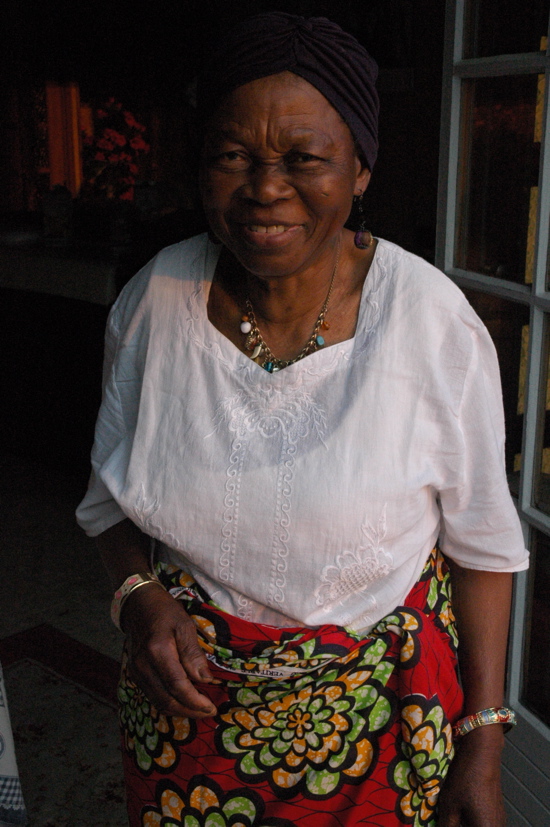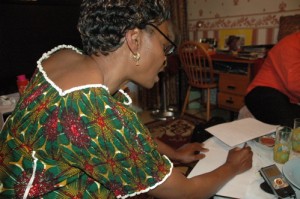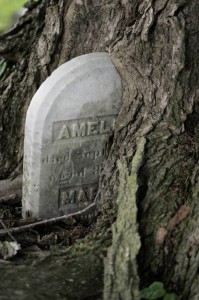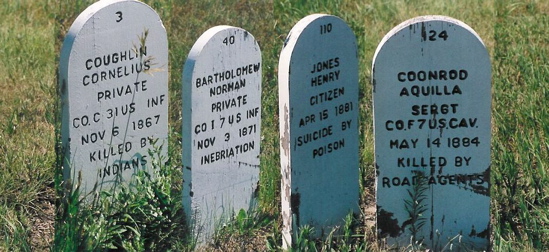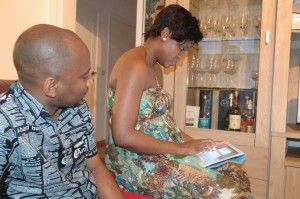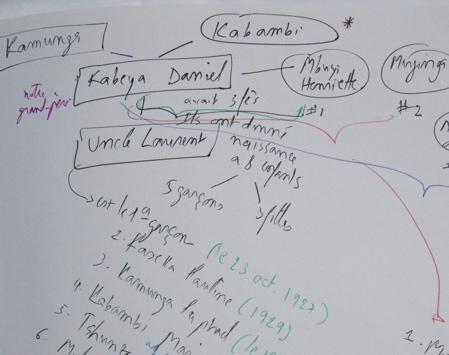This weekend I will be resting for Shabbat as usual. Afterward I will interview my Aunt Malu (seen in the picture above).
There is one minor detail to this plan: my aunt doesn’t speak French. And I barely know any Tshiluba.
No worries, I tell myself, this issue will only spice up our conversation.
I look up some synonyms of ’spice up’ on Thesaurus.com:
“animate, brace up, brighten, divert, entertain, excite, fire up, galvanize, give life to, invigorate, jazz up, juice up, quicken, spark, stimulate, vivificate, vivify, wake up, zap.”
Yep! I can visualize the interview already.
Thank you for reading my stories. Your comments and emails are very much appreciated. Feel free to contact me on my website by filling out the contact form: http://kabuikakamunga.com.
See you next week with new stories of my travels, including “If you want to die quickly, sleep with a Luba woman.”
When it comes to methodology, genealogists say there are three ways of gathering information: find documents in family homes, interview parents, and visit cemeteries.
Now let’s look at this from a Congolese perspective.
Method #1. Find documents such as birth certificates.
That’s only possible when the family is living in the West. If you ask someone in the Congo to send you a copy of a birth certificate, you could wait a while, a long while.
I have a cousin in Europe, who requested a copy of his birth certificate from Kinshasa. He had to wait 6 months to receive it. And when the document arrived, the place of birth was wrong. It said he was born in Kinshasa, instead of Lubumbashi. Not wanting any further delays, he did not request another one. So now in his immigration status in Europe, he officially was born in Kinshasa.
This would be alright … if he didn’t have a twin sister.
Place of birth of my cousin: Kinshasa
Place of birth of my cousin’s twin sister: Lubumbashi
Welcome to my genealogy world!
Method #2. Interview parents, grand-parents, uncles, aunts, and anyone you can get hold of.
This we can do! That’s about the only sure thing we can do in African genealogy since we have a strong oral history culture. In our large families, elders are the guardians of collective memories and are eager to pass on the knowledge to the next generations.
In Paris, I am immersed in oral history. Knowledge is given though stories colored with humor, laughter and the storyteller’s personal snazziness. Read any of my earlier blog entries and you’ll get a taste of it.
Method #3. Visit family tombstones to find names and dates of birth and death.
That works only in well-kept cemeteries like in the West (or even in Morocco). When you die in Kinshasa, you have a chance to be “found” if you get buried in an expensive cemetery, maybe alongside diamond businessmen and powerful politicians. I remember my mother trying to find her father’s tomb a few months only after he passed away. She came back from the cemetery laughing. She never could find it. Overgrown vegetation had taken over the graves.
So do you think that the next time I am in Kinshasa I will find my grand-father’s tomb? Not a chance!
If I thought my family was the only unusual one on the planet, I was wrong. Other family stories beat us hands down in African genealogy adventures.
My friend Myriam, who is Parisian of Moroccan origin, told me that in order for her mother to know her own birthday, she had to go to a cemetery in Morocco.
The tradition there was to tell people: “You were born 2 days after this person passed away. Or 7 days before so and so died.” So to know your birthdate required visiting tombstones to substract or add days to another person’s death date.
In this rare case, to be Congolese is easier. All I have to do is go to the patriarch of my family and get all the birthdays.
“What is grand-father’s date of birth?”
“I don’t know. He was pagan.”
Well, almost all the birth dates. The ones that are missing are those of my ancestors who were pagans.
Dates were not important in our Luba traditions, only events and the order of births. Later on, Catholic missionaries began to keep track of birth records.
So if you were Christian, you knew your birthday.

Mobutu Sese Seko Nkuku Ngbendu wa Za Banga, President of Zaire
Here is a real dialogue (for the sake of privacy, names have been changed).
“What’s your husband’s name?” I ask my cousin A.
“Mobutu” she replies.
“Mobutu? I thought his name was Mutombo,” exclaims my cousin’s sister who has been sitting with us.
“Well, his real name is Mutombo, but his name in Germany is Mobutu.” Cousin A explains.
Confused? You’re not the only one. Here is what I think I understand.
Many Africans are determined to go abroad to the West in search of a better life _ by any means necessary; this includes traveling with someone else’s passport sometimes. I don’t know exactly what is my Cousin A’s husband’s immigration status, but I’m thinking new name, new country, new life.
Now try to keep track of all that in genealogy! They don’t even have such categories in genealogy softwares.
I have started creating my family tree using the Ancestry app for iPad. This has facilitated my work tremendously as I travel and interview family members from one country to the next.
The iPad is gold. I am able to travel light. No need for a laptop. And I can even forgo bringing my heavy paper notebook if I desire. I can do everything with just my iPad.
Using the Ancestry app on my iPad, I have been able to add on information directly onto my family tree during an interview.
Sometimes, such as during my recent trip to Bruxelles, my cousins did the data entry themselves. This allowed me to sit back and socialize while the genealogy work was getting done. After all I was reuniting with this side of the family for the first time in 24 years. That was a blessing.
I like the fact that the genealogy application on my iPad is linked to the Ancestry website whenever I have connection to the internet. This means the family tree gets updated online; and so I can easily share it with all my family members instantly.
Here is what I don’t like (nothing can be perfect):
1. I need to have wifi connection to edit the family tree. Without internet, my family tree can just be a show-off piece like a mere hard copy book. I don’t think the Ancestry app will work too well in the Congo. Most houses do not have wifi connection. So how am I going to use the app and continue building my family tree as I travel from village to village? I wish there was a way to edit one’s family tree on the iPad without wifi. If anyone knows how, please let me know.
2. The second item I don’t like is that I need to enter manually every single person. What if I find entire other family trees that can be linked to my own? We’re talking about large African families. I don’t want to have to copy large family trees manually. There must be an easier way. Any thought on that? Your comments will be very much appreciated.
“The practice of genealogy does not require any diploma and so anyone can do it. It only requires patience, discipline and method.”
That’s what I read in a French booklet on Genealogy.
I’m sure the people who wrote this were only talking Western genealogy. In doing my family tree, I realized that maybe there ought to be an African genealogy certificate. Such genealogy requires superpower patience, which I don’t have much in reserve. A good example is the case of “Multiple Wives.”

A Polygamous family (from http://emeagwali.com)
My people are called Baluba. We are the Luba people. Muluba is what I am; mu- is singular, ba- plural. We are known to be proud, hard working, confident, stubborn and very much disliked by the Belgian colonizers who could not quite control us.
But when it comes to genealogy, the most important characteristic of the Baluba is that Baluba men are polygamous; they love to have several wives and even more children. I have a cousin-in-law, whose father has 45 wives (not children, wives! I haven’t started adding them to our family tree yet. I hope the software won’t crash).
We are proud of our large families, except when it comes to creating a genealogy tree.
“Our grand-father had 12 children. He was a strong Muluba,” the interviewee says with pride and laughter. Our grand-father had three different wives. I quickly jot down the kids who belong to which wife. Later on, as I enter the information on my iPad, a cousin sits down next to me and says I shouldn’t enter the name of the different wives.
“Why not?” I ask, surprised.
“Because that will separate the family,” my cousin replies.
“Separate the family?!”
Here is the issue, she explains. Our grand-mother was the first wife and so the most important one and maybe her children as a result have more “social family status.” By listing the children of the two other wives separately seems, in my cousin’s opinion, to divide the children in three factions.
But then what would be the point of doing a family tree? Since men boast of having several wives, it’s public knowledge. Everyone knows it; my writing it down won’t make any difference.
Now to avoid hurting anyone’s feeling (such as writing down their real mother’s name), I am supposed to go and ask permission to every second wife’s kid, third wife’s kid, and so on, to write their mother’s name down in the family tree.
That’s insane!
If people in the family are ashamed of their mother, they should declare themselves orphan or something. I am not going to write down a fake mother’s name instead.

